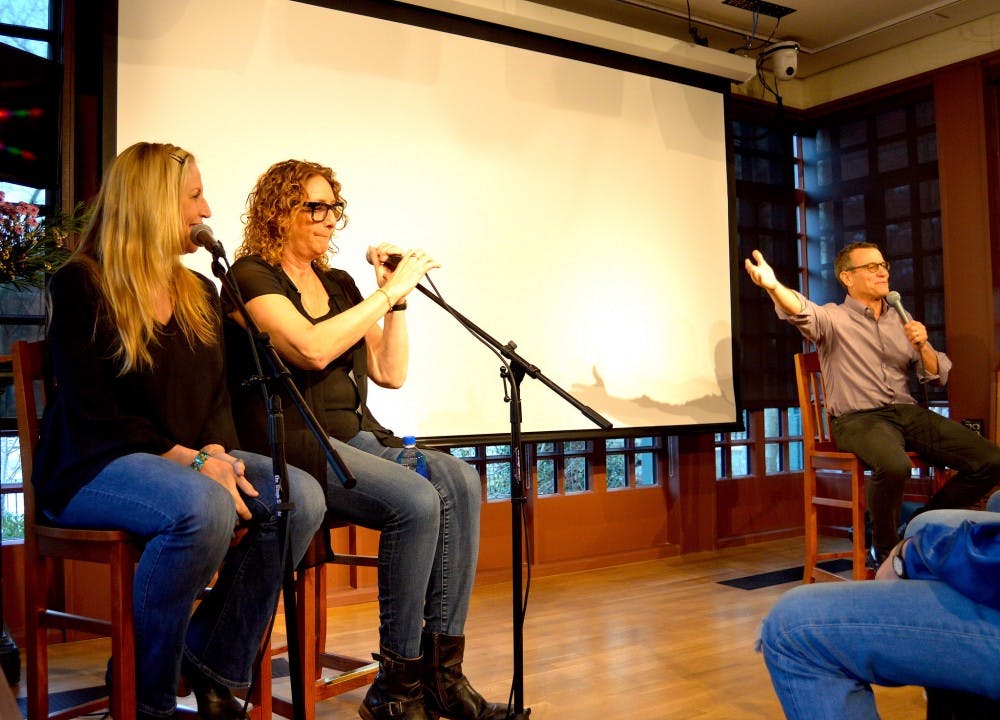On April 3, the Kelly Writers House fourth—annual "Stand–Ups Sit Down" event saw stand–up comedians Laurie Kilmartin and Judy Gold drawing boisterous laughter and heaving gasps of appreciation from the audiences throughout their conversation with host Lew Schneider. Applause resounded within the room as Kilmartin, with a cascading rush of blonde hair, and Gold, with red voluminous curls as bright as her electric character, grinned at the crowds when the event came to an end.
For some people, the popular conception of comedy focuses on male comedians—Stephen Colbert, Seth Meyers, John Mulaney. As a whole, comedy is very much a male dominated industry — with gender disparity being most severe among comedians who perform less frequently. In a 2018 study, shows were performed by 70 percent male, 29 percent women, one percent gender non–conforming comedians. This illustrates a glass ceiling which women comedians require repeated, explosive laughter and applause to successfully break through.
Historians trace the inception of stand–up comedy to the turn–of–the–century vaudeville theaters in New York City burlesque shows. Budding within the escapism from modern urban circumstances, stand–up comedians blossomed, capitalizing on comedy’s suspension of reality to detract from the seriousness of day–to–day lives.
The Watergate scandal, which rocked America to its core, combined with contemporary movements of liberation and rebellion against authority in the 1970s furthered the country's cravings for comedic relief. With the legitimization of the comedy profession and inception of the comedy club, the 1970s are rightfully considered the birth of formalized stand–up.
But, it was the 1980s—as declared by Gold and Kilmartin–that saw a significant boom of comedy, positioning it at the forefront of American pop culture. Television programs such as Saturday Night Live and The Tonight Show created career platforms for Bill Maher, Jay Leno, Robin Williams, Jerry Seinfeld, Steven Wright, and Eddie Murphy while sitcoms, such as The Cosby Show and Roseanne, were massive successes.

Courtesy of Kelly Writers House Staff.
During the Q&A, the ‘Sit–Down’ section of the event, one audience member asks about sexism within the industry. Gold answers first, stating, “It exists; in the 80s we could only wear jeans, making sure that we did not turn anyone on,” ending the sentence with her characteristic jocular wit. Kilmartin adds, "It is interesting, now, to see new female comedians dressing sexy. At this point, these norms are so internalized, I could not imagine myself performing like that."
Gold tends to use her appearance as a red–haired, lesbian, Jewish woman as a punchline. She takes characteristics that are counter to the norms, and integrates them into her jokes. She owns it. Kilmartin does this as well, often making jokes about single motherhood. The women do not deflect with humor, but rather utilize humor as a tool to demonstrate their humanity.
The two continued to address these repetitive double standards: men performed with other men, and it would be an appreciated addition; if women performed with other women, the act was connoted as a “girls’ night” and “her–sterical,” setting it somehow apart from a "normal" comedy show.

Courtesy of Kelly Writers House Staff.
Leaving the Kelly Writers House after the event, it's hard not to think about prospective career paths—law, journalism, or a Ph.D. degree—that are male dominated fields. I think of female friends considering paths in business or STEM—their courage to pursue, their capability to succeed, and their grit to excel in these fields, to combat historical boundaries and norms.
We have come a long way, but still have such a long way to go. When thinking ahead to internships, jobs, and fellowships, I can not help but wonder about the limits women still have to break. Each step forward can be greater than the sum of its parts, and that's perfectly encapsulated by the hour of joy and laughter delivered by Gold and Kilmartin—each breaking boundaries by paving the way for future female comedians.







